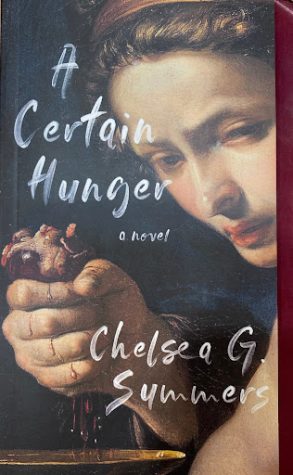Reed Books: A Certain Hunger
January 23, 2022
I didn’t expect a book about cannibalism to make me hungry, but I also didn’t expect a book about cannibalism to be so good.
A Certain Hunger by Chelsea G. Summers is told from the perspective of Dorothy Daniels, a food-critic-turned-cannibal, after she’s been caught. Writing from prison, Dorothy has no reason to lie; the novel is a fictional autobiography, tell-all, confessional. It’s one of the stranger books I’ve read (for obvious reasons) but also one of the best.

The thing about Dorothy is that no matter how evil she is, villainous and psychopathic (her own words) she never fails to be interesting. Thus brings about the central theme of the book – being good and boring, or bad and entertaining. You can guess what camp Dorothy falls in.
With almost no dialogue, the book reads in long paragraphs, often jumping around in flashbacks and flashforwards, or whatever Dorothy decides she wants us to know. You cannot “skim” A Certain Hunger. It demands that you read every perfectly grotesque word, parse every revoltingly engineered sentence. Dorothy gets what she wants, and she wants you to read.
So while this may be a slow read, that’s kind of the point. Summers insists that you savor the novel like a good meal. I could flip to any page, point to any sentence, and be in awe of the wit, the well-deserved arrogance. A man might have “yeasty beastliness,” young women “gleam with promise and promiscuity.” When justifying her cannibalism, Dorothy explains, “To eat people is to get the taste of a Titan. It’s infinite immortalization. It makes a god out of a woman. But then, I am an excellent cook.”
For all of its obvious grotesqueness, Summers doesn’t overdo the gore, which I was grateful for. She doesn’t avoid it – this is from the perspective of a serial killer, after all – but it’s somewhat tasteful, somewhat matter-of-fact. Similarly, the animal cruelty is very limited, which is especially difficult if you’re writing about food. No topic is avoided, but no topic is overdone.
As if this weren’t enough, Summers makes poignant takes on feminism, capitalism, classism. She avoids simply #girlbossing the protagonist, thank God, but makes sure Dorothy is at least a bit relatable to the modern woman. Dorothy is a bad person in a way that only men have been allowed to be in mainstream media. Violence against women is normalized, is expected, in male antagonists and protagonists alike; in A Certain Hunger, the violence is almost exclusively against men by the hands of women. I wouldn’t call it cathartic, because I don’t want that on the record, but there is something refreshing about the inversion of gender roles. All of Dorothy’s victims are men; the only men in the book, actually, are victims, lovers, or once-referenced family members, reduced to the same tropes that women are in “anti-hero” fiction. On the opposite side, Dorothy herself is a woman. Dorothy’s best friend is a woman. Dorothy’s lawyer, Dorothy’s cellmates, Dorothy’s mother, Dorothy’s teenage friends, Dorothy’s therapist, even the police officer that finally takes her down, are all women. Men become the roughly interchangeable plot devices that women have been forced to be for centuries, while women are allowed fuller characterization and diversity.
Dorothy doesn’t change by the end. There is no redemption arc for her. Her single goal – being “immutable,” as she claims all women want to be – is reached. She is unapologetically the worst person you know, and you can’t look away.
And when you do finish the book, you find yourself craving Dorothy’s, or rather Summer’s, writing again. Her hilarious commentary and biting social analyses that make you cover your eyes but keep turning the page.
You find yourself starving for it.





















































